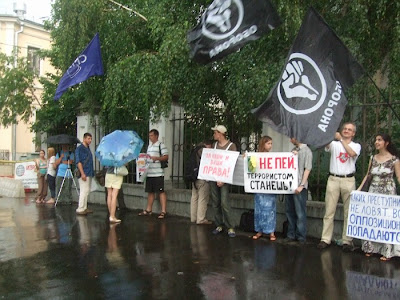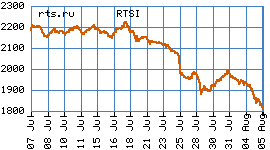Other Russia translates Yulia Latynina from Yezhedevny Zhurnal:
Last week, at a meeting in Nizhny Novgorod, Prime Minister [Vladimir] Putin came down hard on a company which was damaging Russia’s economy with its work.
It turned out this company was by no means Baikalfinansgrup, which bought Yuganskneftegaz at a non-competitive auction on credit provided by the government. And it wasn’t the Gunvor group, which belongs to a friend of premier Putin and receives 70 billion dollars annual income from the export of Russian oil. And not RosUkrEnergo, whose right to deliver gas to the Ukraine using non-transparent arrangements is whole-heartedly defended by Russian bureaucrats at the highest level.
It turned out to be Mechel, condemned for selling coal abroad at prices two times lower than domestic ones. The company’s owner, Igor Zyuzin, did not appear at at the meeting, citing illness. “Of course, illness is illness,” premier [Putin] said, then recommending a speedy recovery for Mechel’s owner. “Otherwise we’ll have to send him a doctor to clear out all these problems.”
Putin’s promise to send Zyuzin a doctor cost Mr. Zyuzin 5 billion dollars — it was exactly this amount by which Mechel’s market capitalization collapsed that evening on the New York exchange.
The reason why Mechel in particular dissatisfied the premier was such: The largest Russian metallurgical giants, including the Novolipetsky [NLMK] and Magnitogorsky metallurgical complexes, buy up coal on the side, and as a consequence, are interested in long-term contracts for coal delivery during times of sharp price increases.
Mechel, which supplies them with coal, is a coal extracting company, and is accordingly interested in spot contracts for coal delivery, which allow it to maximize sales profit; And, should the opportunity arise, to use the deficit of coal as a lever to gain control over small factories (Gubakha, for instance).
It is clear that giants like NLMK and Magnitka are much closer to the Kremlin, and especially to Vice-Premier Sechin, who now oversees industry. It was precisely Sechin, who, with active participation of the metallurgical giants, prepared the report that has raised so much attention.
It sticks out like a sore thumb that this is already Premier Putin’s second attempt at direct interference in the economy. A week ago, high prices for jet fuel elicited his discontent. If earlier, during his presidency, President Putin underscored in every way that “the Yukos affair” was an exception, then now, it seems Premier Putin is making it clear to everyone that he is intent on directing the economy by hand.
Mechel, which was worth around 15 billion dollars just last week, recently laid out around 2.5 billion dollars for a controlling stake in two large coal companies –Yakutugol and Elgaugol –and in doing so, beat out the state-run ALROSA. Yakutugol has been online for a long while. Elgaugol is simply a section of taiga, and several billon dollars are needed to develop it.
It is obvious that in the near term, it will be hard for a company that paid money for non-operational assets in an open auction to raise the means to develop them. If Mechel goes bankrupt, and its assets are sold for peanuts, Mechel’s shareholders (I’ll remind you that the company had its IPO and lists its shares on the New York Stock Exchange), may well file against Premier Putin in the New York City court.
And if the Yukos shareholders, in filing their corresponding lawsuit, expect to prove that precisely Vladimir Putin or Igor Sechin are guilty for their misfortunes, then everything is available right here. It is hard to imagine George Bush, threatening to “send a doctor” to Bill Gates. One doesn’t speak to businessmen this way in the free world. Crime bosses speak this way to an out of line merchant. Usually, proof of these threats is obtained in a strategic way, wrapping oneself in microphones. Here the threats sounded right on the television.
One question –how much will this affair cost Mechel? Although in my opinion, something else is far more interesting –how much will it cost the Magnitka and Lipetsky [metallurgical plants]. What has happened comes out as the classic illustration of the proverb: don’t call a wolf to help you with the dogs. The metallurgical giants turned to Vice-Premier Sechin, to help him fight with inflation by forcing Mechel into long-term contracts. The general fall of the market has already cost Russia’s steel sector far more than the losses from spot contracts, by which Zyuzin sold coal. After all, zealous bureaucrats will now be checking everyone, not just Mechel. It is always this way with chekists and bandits: if you ask them for a favor, it’s uncertain if they will accommodate it or not. But you’re still certain to owe them.
But the most interesting part –how much will this affair cost Premier Putin? It isn’t a question of whether business will start to speak up in Mechel’s defense –no one has any illusions here. Business will be tearing chunks out of Mechel, and its mouth will be busy. But then Mechel will likely run for protection to President Medvedev, and there aren’t any reasons why President Medvedev wouldn’t provide it with protection. If nothing happens with Mechel, and prices for airline tickets don’t fall, this will mean that Premier Putin can’t regulate the prices of either jet fuel, or coking coal.
And this is very bad, when the premier sends a doctor every week, and the doctor just doesn’t arrive. This way one can quickly tumble down to the level of Premier [Mikhail] Fradkov, who every week would loudly censure [German] Gref, or [Alexei] Kudrin. But for some reason, he could never do anything to them.









